Module2 Public holidays词汇课件(23张PPT)
文档属性
| 名称 | Module2 Public holidays词汇课件(23张PPT) |  | |
| 格式 | pptx | ||
| 文件大小 | 12.6MB | ||
| 资源类型 | 教案 | ||
| 版本资源 | 外研版 | ||
| 科目 | 英语 | ||
| 更新时间 | 2021-07-12 11:02:04 | ||
图片预览

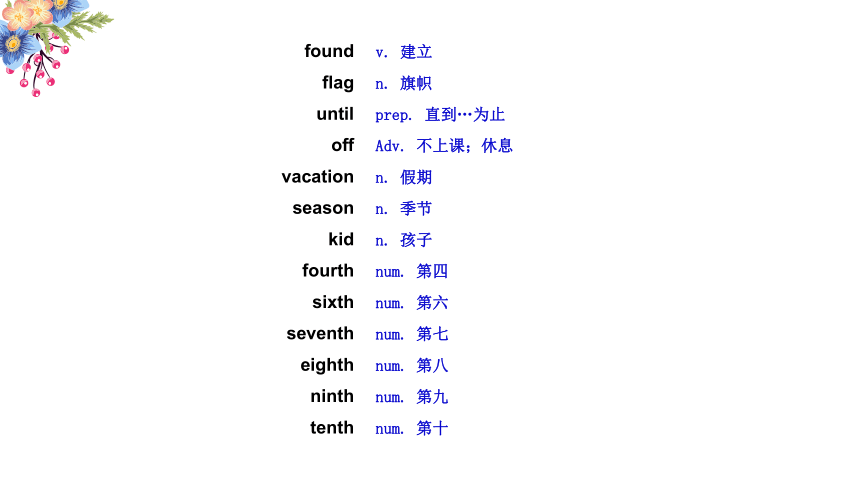
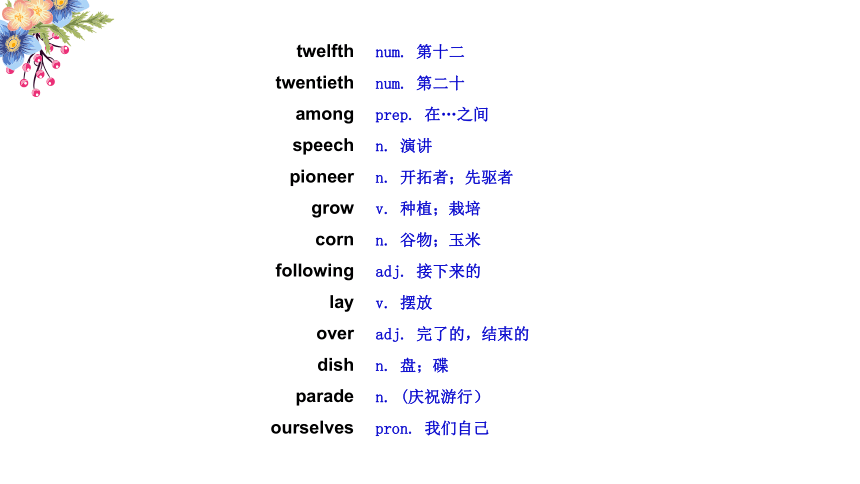
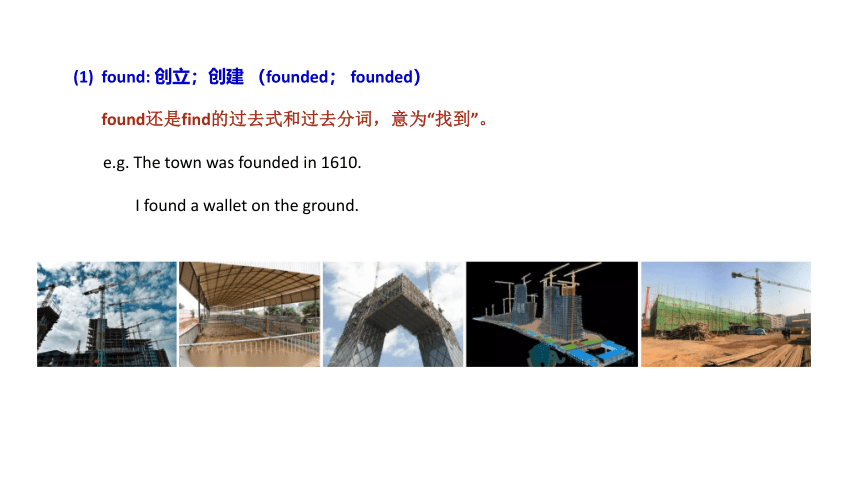
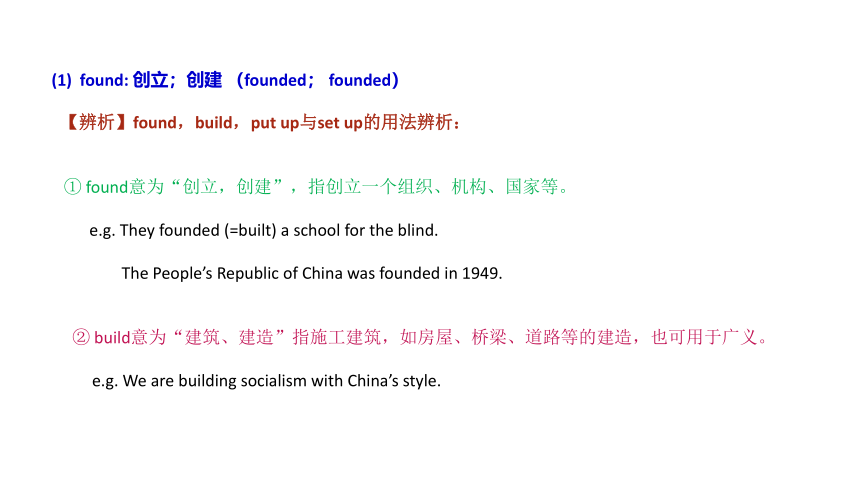
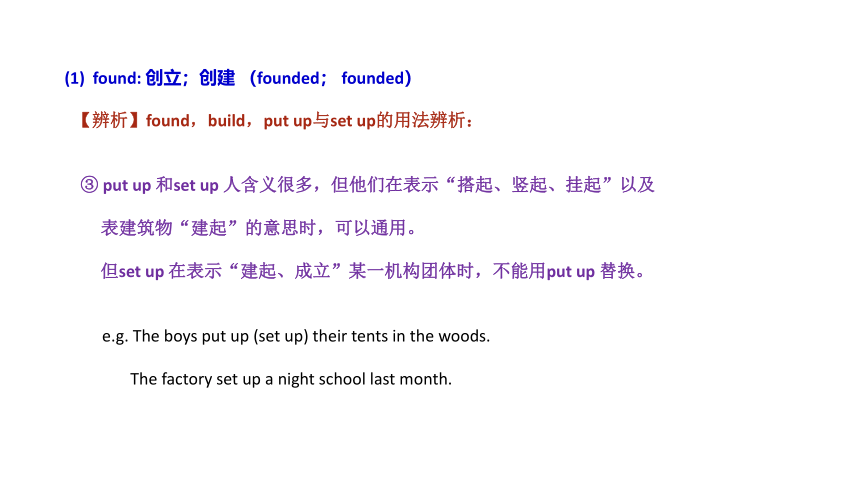
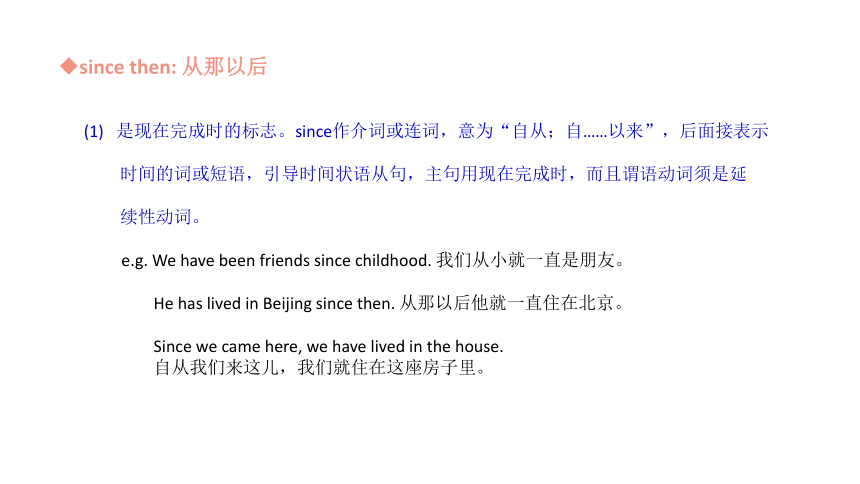
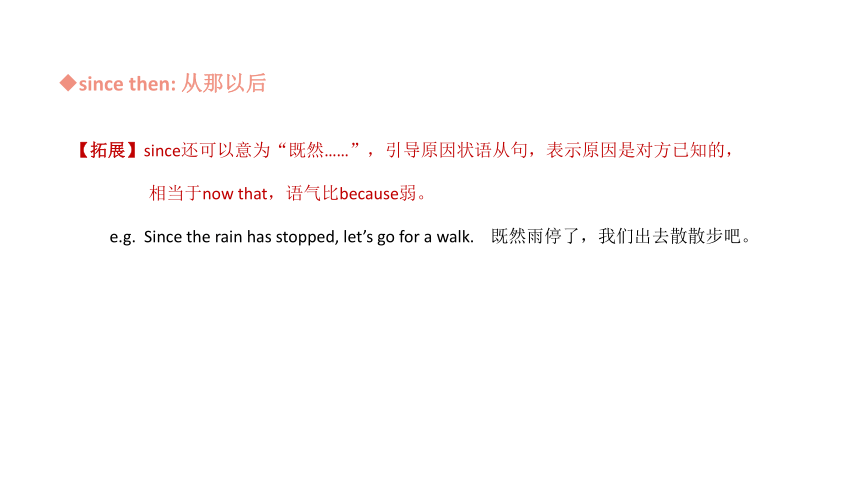
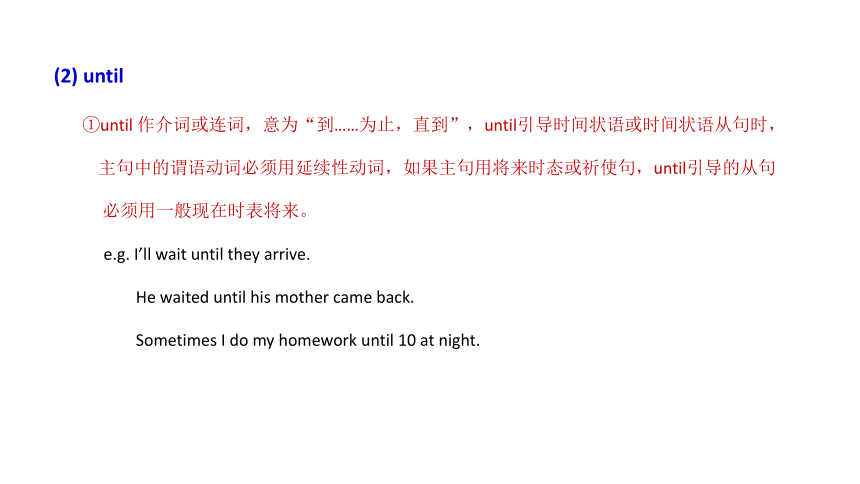
文档简介
(共22张PPT)
外研版九年级上册
Module 2 Public holidays
外研版9年级上册
found
flag
until
off
vacation
season
kid
fourth
sixth
seventh
eighth
ninth
tenth
v. 建立
n. 旗帜
prep. 直到…为止
Adv. 不上课;休息
n. 假期
n. 季节
n. 孩子
num. 第四
num. 第六
num. 第七
num. 第八
num. 第九
num. 第十
twelfth
twentieth
among
speech
pioneer
grow
corn
following
lay
over
dish
parade
ourselves
num. 第十二
num. 第二十
prep. 在…之间
n. 演讲
n. 开拓者;先驱者
v. 种植;栽培
n. 谷物;玉米
adj. 接下来的
v. 摆放
adj. 完了的,结束的
n. 盘;碟
n. (庆祝游行)
pron. 我们自己
found: 创立;创建 (founded; founded)
found还是find的过去式和过去分词,意为“找到”。
e.g. The town was founded in 1610.
I found a wallet on the ground.
found: 创立;创建 (founded; founded)
【辨析】found,build,put up与set up的用法辨析:
① found意为“创立,创建”,指创立一个组织、机构、国家等。
e.g. They founded (=built) a school for the blind.
The People’s Republic of China was founded in 1949.
② build意为“建筑、建造”指施工建筑,如房屋、桥梁、道路等的建造,也可用于广义。
e.g. We are building socialism with China’s style.
found: 创立;创建 (founded; founded)
【辨析】found,build,put up与set up的用法辨析:
③ put up 和set up 人含义很多,但他们在表示“搭起、竖起、挂起”以及
表建筑物“建起”的意思时,可以通用。
但set up 在表示“建起、成立”某一机构团体时,不能用put up 替换。
e.g. The boys put up (set up) their tents in the woods.
The factory set up a night school last month.
是现在完成时的标志。since作介词或连词,意为“自从;自……以来”,后面接表示
时间的词或短语,引导时间状语从句,主句用现在完成时,而且谓语动词须是延
续性动词。
e.g. We have been friends since childhood. 我们从小就一直是朋友。
He has lived in Beijing since then. 从那以后他就一直住在北京。
Since we came here, we have lived in the house.
自从我们来这儿,我们就住在这座房子里。
since then: 从那以后
【拓展】since还可以意为“既然……”,引导原因状语从句,表示原因是对方已知的,
相当于now that,语气比because弱。
e.g. Since the rain has stopped, let’s go for a walk. 既然雨停了,我们出去散散步吧。
since then: 从那以后
(2) until
①until 作介词或连词,意为“到……为止,直到”,until引导时间状语或时间状语从句时,
主句中的谓语动词必须用延续性动词,如果主句用将来时态或祈使句,until引导的从句
必须用一般现在时表将来。
e.g. I’ll wait until they arrive.
He waited until his mother came back.
Sometimes I do my homework until 10 at night.
(2) until
② not...until... 意为“直到……才……”。
表示主语的动作在某一时间或某一动作之前没有发生,其中until可以用till代替。
在not...until...结构中,主句的谓语动词是终止性动词。
e.g. They didn’t leave until/till I arrived.
I didn’t wake up until/till I heard the alarm clock.
I _____ until he came back.
A. didn’t wait B. waited C. won’t leave D. left
all kinds of: 各种各样的
kind是可数名词,意为“种类”,相当于type或者sort。
与kind有关的短语:
many kinds of许多种类的;
a kind of 一种;
different kinds of 不同种类的;
of a kind同一种类的。
e.g. There are all kinds of animals in the zoo. 动物园里有各种各样的动物。
You can taste all kinds of delicious food. 你能品尝各种各样美味的食物。
all kinds of: 各种各样的
【拓展】kind of意为“有点”,其后常常跟形容词。
e.g. I’m kind of hungry. Could you give me some food
我有点饿了。你能给我一些食物吗?
as soon as:一…就…
1) 引导时间状语从句,强调两个动作接连发生,从句中的谓语动词常为短暂性动词;
2) as soon as引导从句时,如果主句用将来时态或祈使句,从句常用一般现在时表将来。
e.g. Please call me as soon as you get to the hotel.
If it doesn’t rain, we will have a picnic tomorrow.
We’ll go back to school as soon as the May Day holiday is over.
As soon as his father went out, the boy ran to the cinema.
(3) among
【辨析】among与between的用法辨析:
① among意为“在……中间”,一般表示在三个或三个以上的人或物之间;
其宾语通常是表示笼统数量或具有复数意义的名词或代词。
e.g. The teacher sat among the children.
Who sings best among them
My grandpa has a house among the trees.
(3) among
【辨析】among与between的用法辨析:
②between意为“在……之间”,一般表示在两者之间,其宾语往往是表示两者的名词或代词,
或者是由and连接两个具体的人或物。
e.g. I am sitting between my parents. 我正坐在我父母中间。
I am sitting between Mike and Tom. 我坐在迈克和汤姆中间。
Can you tell the differences between the two pictures 你能告诉我这两幅画之间的区别吗?
1.The man who is standing ________ the students is Lily's father.
2.I will be back ________ five and six.
3.The pay phone is ________ the hospital and the library.
(4) following: 接下来;接下来的
e.g. the following year= the next year意为“第二年,接下来的一年”;
following是形容词,意为“接下来的,接着的,下列/面的”,常用来作定语。
其动词形式为follow,意为“跟上”。
e.g. I will use the following model.
Can you name the following things in English
(5) lay (laid; laid) 摆放餐桌
lay the table意为“摆设桌子”。
lay是动词,意为“摆放(餐桌),其过去式为laid;过去分词为laid。
e.g. My mother asked me to lay the table for dinner.
(5) lay (laid; laid) 摆放餐桌
lie→lay→lain→lying 躺;位于;
lay→laid→laid→laying 下蛋;产卵;放置
e.g. The hen laid an egg this morning.
He lay on the bed, listening to his favourite music.
The man lying there lied that he had laid the money on the table.
(6) over: adj 完了的;结束的
be over意为“完成,结束”,over是形容词,意为“完了的;结束的”。
e.g. Is the meeting over
Class is over.
感谢您的观看
外研版九年级上册
Module 2 Public holidays
外研版9年级上册
found
flag
until
off
vacation
season
kid
fourth
sixth
seventh
eighth
ninth
tenth
v. 建立
n. 旗帜
prep. 直到…为止
Adv. 不上课;休息
n. 假期
n. 季节
n. 孩子
num. 第四
num. 第六
num. 第七
num. 第八
num. 第九
num. 第十
twelfth
twentieth
among
speech
pioneer
grow
corn
following
lay
over
dish
parade
ourselves
num. 第十二
num. 第二十
prep. 在…之间
n. 演讲
n. 开拓者;先驱者
v. 种植;栽培
n. 谷物;玉米
adj. 接下来的
v. 摆放
adj. 完了的,结束的
n. 盘;碟
n. (庆祝游行)
pron. 我们自己
found: 创立;创建 (founded; founded)
found还是find的过去式和过去分词,意为“找到”。
e.g. The town was founded in 1610.
I found a wallet on the ground.
found: 创立;创建 (founded; founded)
【辨析】found,build,put up与set up的用法辨析:
① found意为“创立,创建”,指创立一个组织、机构、国家等。
e.g. They founded (=built) a school for the blind.
The People’s Republic of China was founded in 1949.
② build意为“建筑、建造”指施工建筑,如房屋、桥梁、道路等的建造,也可用于广义。
e.g. We are building socialism with China’s style.
found: 创立;创建 (founded; founded)
【辨析】found,build,put up与set up的用法辨析:
③ put up 和set up 人含义很多,但他们在表示“搭起、竖起、挂起”以及
表建筑物“建起”的意思时,可以通用。
但set up 在表示“建起、成立”某一机构团体时,不能用put up 替换。
e.g. The boys put up (set up) their tents in the woods.
The factory set up a night school last month.
是现在完成时的标志。since作介词或连词,意为“自从;自……以来”,后面接表示
时间的词或短语,引导时间状语从句,主句用现在完成时,而且谓语动词须是延
续性动词。
e.g. We have been friends since childhood. 我们从小就一直是朋友。
He has lived in Beijing since then. 从那以后他就一直住在北京。
Since we came here, we have lived in the house.
自从我们来这儿,我们就住在这座房子里。
since then: 从那以后
【拓展】since还可以意为“既然……”,引导原因状语从句,表示原因是对方已知的,
相当于now that,语气比because弱。
e.g. Since the rain has stopped, let’s go for a walk. 既然雨停了,我们出去散散步吧。
since then: 从那以后
(2) until
①until 作介词或连词,意为“到……为止,直到”,until引导时间状语或时间状语从句时,
主句中的谓语动词必须用延续性动词,如果主句用将来时态或祈使句,until引导的从句
必须用一般现在时表将来。
e.g. I’ll wait until they arrive.
He waited until his mother came back.
Sometimes I do my homework until 10 at night.
(2) until
② not...until... 意为“直到……才……”。
表示主语的动作在某一时间或某一动作之前没有发生,其中until可以用till代替。
在not...until...结构中,主句的谓语动词是终止性动词。
e.g. They didn’t leave until/till I arrived.
I didn’t wake up until/till I heard the alarm clock.
I _____ until he came back.
A. didn’t wait B. waited C. won’t leave D. left
all kinds of: 各种各样的
kind是可数名词,意为“种类”,相当于type或者sort。
与kind有关的短语:
many kinds of许多种类的;
a kind of 一种;
different kinds of 不同种类的;
of a kind同一种类的。
e.g. There are all kinds of animals in the zoo. 动物园里有各种各样的动物。
You can taste all kinds of delicious food. 你能品尝各种各样美味的食物。
all kinds of: 各种各样的
【拓展】kind of意为“有点”,其后常常跟形容词。
e.g. I’m kind of hungry. Could you give me some food
我有点饿了。你能给我一些食物吗?
as soon as:一…就…
1) 引导时间状语从句,强调两个动作接连发生,从句中的谓语动词常为短暂性动词;
2) as soon as引导从句时,如果主句用将来时态或祈使句,从句常用一般现在时表将来。
e.g. Please call me as soon as you get to the hotel.
If it doesn’t rain, we will have a picnic tomorrow.
We’ll go back to school as soon as the May Day holiday is over.
As soon as his father went out, the boy ran to the cinema.
(3) among
【辨析】among与between的用法辨析:
① among意为“在……中间”,一般表示在三个或三个以上的人或物之间;
其宾语通常是表示笼统数量或具有复数意义的名词或代词。
e.g. The teacher sat among the children.
Who sings best among them
My grandpa has a house among the trees.
(3) among
【辨析】among与between的用法辨析:
②between意为“在……之间”,一般表示在两者之间,其宾语往往是表示两者的名词或代词,
或者是由and连接两个具体的人或物。
e.g. I am sitting between my parents. 我正坐在我父母中间。
I am sitting between Mike and Tom. 我坐在迈克和汤姆中间。
Can you tell the differences between the two pictures 你能告诉我这两幅画之间的区别吗?
1.The man who is standing ________ the students is Lily's father.
2.I will be back ________ five and six.
3.The pay phone is ________ the hospital and the library.
(4) following: 接下来;接下来的
e.g. the following year= the next year意为“第二年,接下来的一年”;
following是形容词,意为“接下来的,接着的,下列/面的”,常用来作定语。
其动词形式为follow,意为“跟上”。
e.g. I will use the following model.
Can you name the following things in English
(5) lay (laid; laid) 摆放餐桌
lay the table意为“摆设桌子”。
lay是动词,意为“摆放(餐桌),其过去式为laid;过去分词为laid。
e.g. My mother asked me to lay the table for dinner.
(5) lay (laid; laid) 摆放餐桌
lie→lay→lain→lying 躺;位于;
lay→laid→laid→laying 下蛋;产卵;放置
e.g. The hen laid an egg this morning.
He lay on the bed, listening to his favourite music.
The man lying there lied that he had laid the money on the table.
(6) over: adj 完了的;结束的
be over意为“完成,结束”,over是形容词,意为“完了的;结束的”。
e.g. Is the meeting over
Class is over.
感谢您的观看
同课章节目录
- Module 1 Wonders of the world
- Unit 1 It's more than 2,000 years old.
- Unit 2 The Grand Canyon was not just big.
- Unit 3 Language in use
- Module 2 Public holidays
- Unit 1 My family always go somewhere interesting a
- Unit 2 We have celebrated the festival since the f
- Unit 3 Language in use
- Module 3 Heroes
- Unit 1 She trained hard,so she became a great play
- Unit 2There were few doctors, so he had to work ve
- Unit 3 Language in use
- Module 4 Home alone
- Unit 1 I can look after myself, although it won’t
- Unit 2 I became so bored with their orders that I
- Unit 3 Language in use
- Module 5 Museums
- Unit 1 Don't cross that rope!
- Unit 2 If you ever go to London, make sure you vis
- Unit 3 Language in use
- Module 6 Problems
- Unit 1 If I start after dinner, I'll finish it be
- Unit 2 If you tell him the truth now, you will sho
- Unit 3 Language in use
- Revision Module A
- Module 7 Great books
- Unit 1 We're still influenced by Confucius's idea
- Unit 2 It is still read and loved.
- Unit 3 Language in use
- Module 8 Sports life
- Unit 1 Daming wasn't chosen for the team last time
- Unit 2 He was invited to competitions around the w
- Unit 3 Language in use
- Module 9 Great inventions
- Unit 1 Will computers be used more than books in t
- Unit 2 Will books be replaced by the Internet?
- Unit 3 Language in use
- Module 10 Australia
- Unit 1 I have some photos that I took in Australia
- Unit 2 The game that they like most is Australian
- Unit 3 Language in use
- Module 11 Photos
- Unit 1 He's the boy who won the photo competition
- Unit 2 The photo which we liked best was taken by
- Unit 3 Language in use
- Module 12 Save our world
- Unit 1 If everyone starts to do something, the wor
- Unit 2 Repeat these three words daily: reduce, reu
- Unit 3 Language in use
- Revision Module B
